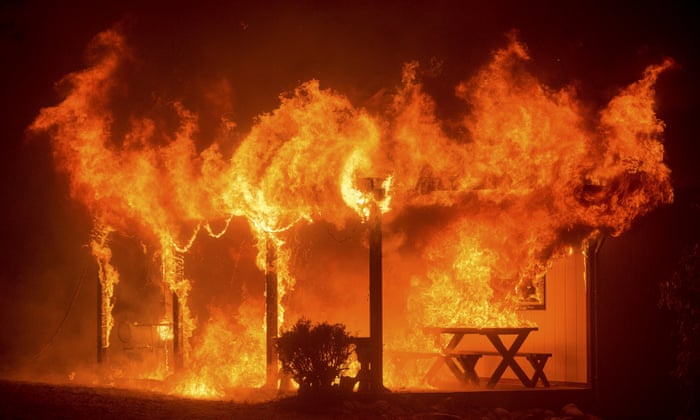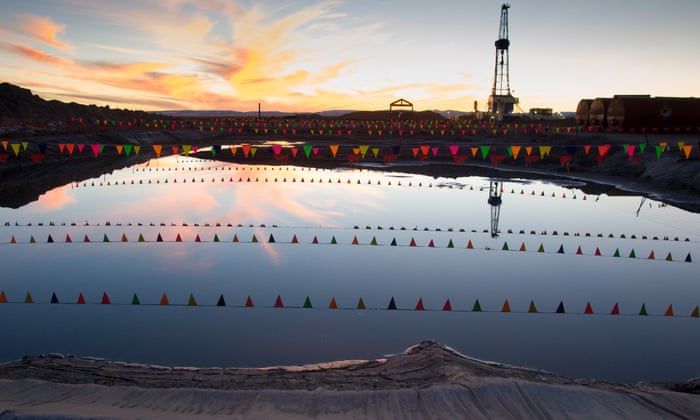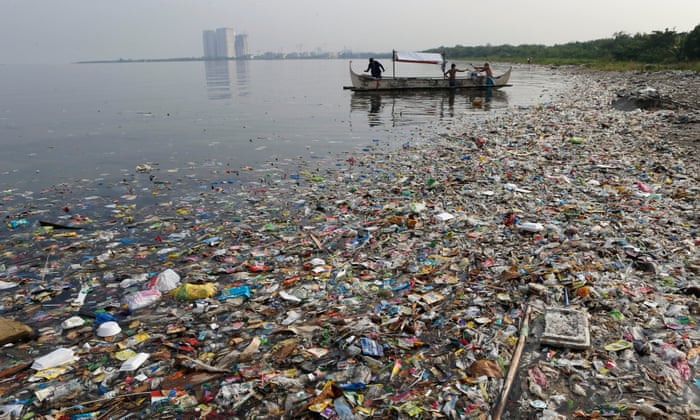 A mountain town is standing by to evacuate on Saturday and residents across a huge swath of northern California have been warned of “explosive fire conditions” as a fierce wildfire across more than 100 square miles suddenly intensified.
A mountain town is standing by to evacuate on Saturday and residents across a huge swath of northern California have been warned of “explosive fire conditions” as a fierce wildfire across more than 100 square miles suddenly intensified.
California governor Jerry Brown has declared a state of emergency for the counties experiencing the inferno, as it approaches the town of San Andreas, about 60 miles south-east of Sacramento in the Sierra Nevada region.
Explosive wildfire threatens California mountain towns as blaze intensifies
Drilling boom means more harmful waste spills
 An Associated Press analysis of data from leading oil- and gas-producing states found more than 180 million gallons of wastewater spilled from 2009 to 2014 in incidents involving ruptured pipes, overflowing storage tanks and other mishaps or even deliberate dumping. There were some 21,651 individual spills. And these numbers are incomplete because many releases go unreported.
An Associated Press analysis of data from leading oil- and gas-producing states found more than 180 million gallons of wastewater spilled from 2009 to 2014 in incidents involving ruptured pipes, overflowing storage tanks and other mishaps or even deliberate dumping. There were some 21,651 individual spills. And these numbers are incomplete because many releases go unreported.
Though oil spills tend to get more attention, wastewater spills can be more damaging. And in seven of the 11 states the AP examined, the amount of wastewater released was at least twice that of oil discharged.
Alberta lets Nexen reopen some Long Lake pipelines
 Alberta's energy regulator will allow Nexen Energy, the Canadian subsidiary of China's CNOOC Ltd, to reopen some pipelines ordered closed following a major spill.
Alberta's energy regulator will allow Nexen Energy, the Canadian subsidiary of China's CNOOC Ltd, to reopen some pipelines ordered closed following a major spill.
The Alberta Energy Regulator said late on Sunday that it would allow a restart of 40 of 95 pipelines closed at Nexen's Long Lake oil sands operations after reviewing maintenance and monitoring documentation.
EPA Urged by Nearly 100,000 in the US to Redo Highly Controversial Fracking Study
 The public comment period for the highly controversial US Environmental Protection Agency’s (EPA) fracking study ends today. Food & Water Watch, Environmental Action, Breast Cancer Action and other advocacy groups delivered nearly 100,000 comments from Americans asking the US EPA to redo their study with a higher level of scrutiny and oversight.
The public comment period for the highly controversial US Environmental Protection Agency’s (EPA) fracking study ends today. Food & Water Watch, Environmental Action, Breast Cancer Action and other advocacy groups delivered nearly 100,000 comments from Americans asking the US EPA to redo their study with a higher level of scrutiny and oversight.
The study produced significant controversy due to the discrepancy in what the EPA found in its report and what the agency’s news release title said. The study stated that “we did not find evidence” of “widespread, systemic impacts to drinking water resources,” but the title of the EPA’s news release said, “Assessment shows hydraulic fracturing activities have not led to widespread, systemic impacts to drinking water resources”—a subtle but significant difference that led to most news coverage having headlines like this one in Forbes, “EPA Fracking Study: Drilling Wins.”
Big Bank Says It’s Going To Cost A Lot To Do Nothing On Global Warming
 A new report from Citibank found that acting on climate change by investing in low-carbon energy would save the world $1.8 trillion through 2040, as compared to a business-as-usual scenario. In addition, not acting will cost an additional $44 trillion by 2060 from the “negative effects” of climate change.
A new report from Citibank found that acting on climate change by investing in low-carbon energy would save the world $1.8 trillion through 2040, as compared to a business-as-usual scenario. In addition, not acting will cost an additional $44 trillion by 2060 from the “negative effects” of climate change.
The report, titled Energy Darwinism, looked at the predicted cost of energy over the coming decades, the costs of developing low carbon energy sources, and the implications of global energy choices.
General Mills Warns Climate Change Will Lead To Global Food Shortages
n a rebuff to climate deniers, the CEO of American food giant General Mills has asserted that global warming is being created by human activity and is threatening to disrupt global food supplies.
Announcing that the company has set a goal of reducing its greenhouse gas emissions by 28 percent over the next decade across its value chain, from farm to fork to landfill, Ken Powell told The Associated Press: “We think that human-caused greenhouse gas causes climate change and climate volatility and that's going to stress the agricultural supply chain, which is very important to us. Obviously we depend on that for our business, and we all depend on that for the food we eat."
NASA: Sea Level Rise Likely To Get Much Worse
 Sea levels worldwide rose an average of nearly 3 inches (8 cm) since 1992, the result of warming waters and melting ice, a panel of NASA scientists said on Wednesday.
Sea levels worldwide rose an average of nearly 3 inches (8 cm) since 1992, the result of warming waters and melting ice, a panel of NASA scientists said on Wednesday.
In 2013, a United Nations panel predicted sea levels would rise from 1 to 3 feet (0.3 to 0.9 meters) by the end of the century. The new research shows that sea level rise most likely will be at the high end of that range, said University of Colorado geophysicist Steve Nerem.
Activists threaten lawsuit against EPA over fracking-induced earthquakes
 Environmental groups have threatened to sue the Obama administration for failing to prevent swarms of earthquakes that came in the wake of America’s fracking boom.
Environmental groups have threatened to sue the Obama administration for failing to prevent swarms of earthquakes that came in the wake of America’s fracking boom.
In a first step to a lawsuit, the groups on Wednesday challenged the Environmental Protection Agency to improve what they said were weak laws governing the disposal of fracking waste – or go to court.
The groups, led by the Environmental Integrity Project, said the EPA had stalled for years in regulating waste from the oil and gas industry.
Trash-mapping expedition sheds light on 'Great Pacific Garbage Patch'
 Scientists and volunteers who have spent the last month gathering data on how much plastic garbage is floating in the Pacific Ocean returned to San Francisco on Sunday and said most of the trash they found is in medium to large-sized pieces, as opposed to tiny ones.
Scientists and volunteers who have spent the last month gathering data on how much plastic garbage is floating in the Pacific Ocean returned to San Francisco on Sunday and said most of the trash they found is in medium to large-sized pieces, as opposed to tiny ones.
Volunteer crews on 30 boats have been measuring the size and mapping the location of tons of plastic waste floating between the west coast and Hawaii that according to some estimates covers an area twice the size of Texas.
More Articles...
Page 20 of 156

 Environmental News Archive
Environmental News Archive


































